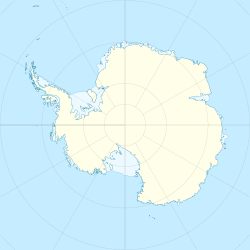Largo Island facts for kids
|
Location in Antarctica
|
|
| Geography | |
|---|---|
| Location | Antarctica |
| Coordinates | 63°18′S 57°53′W / 63.300°S 57.883°W |
| Administration | |
| Administered under the Antarctic Treaty System | |
| Demographics | |
| Population | Uninhabited |
Largo Island is a long island found in Antarctica. It is the biggest island in a group called the Duroch Islands. This group is located in Graham Land, a part of the Antarctic Peninsula. Largo Island stretches for about 2 kilometers (1 nautical mile).
Contents
Largo Island: A Long Island in Antarctica
Largo Island is located about 2 kilometers (1 nautical mile) west of Halpern Point. This point is part of the Trinity Peninsula in Antarctica. The island is not home to any people. It is part of the Antarctic Treaty System, which means it is used only for peaceful scientific research.
How Largo Island Got Its Name
The island was first explored and mapped by the Chilean Antarctic Expedition between 1947 and 1948. At that time, they thought it was three separate islands. They gave these islands the names Rozas, Swett, and Horn.
Later, in 1961–62, a team from the University of Wisconsin–Madison explored the area. This team was led by Martin Halpern. They discovered that what was thought to be three islands was actually just one long island. Chilean officials at the nearby General Bernardo O'Higgins Station called it "Largo." This word means "long" in Spanish, which perfectly describes the island's shape. So, the name "Largo Island" stuck.
Rocks Around Largo Island
Several rocks near Largo Island have also been mapped and named by the Chilean Antarctic Expedition. These rocks are important for navigation in the area.
Labbé Rock
Labbé Rock is a rock located about 1.3 kilometers (0.7 nautical miles) northwest of Largo Island. It was named after First Lieutenant Custodio Labbé Lippi. He was a navigation officer on a transport ship called Angamos during the expedition.
Acuña Rocks
The Acuña Rocks are a pair of rocks found about 0.6 kilometers (0.4 miles) west of Largo Island. They are also known as Islote Acuña. These rocks were named after Sub-Teniente Acuña, who was another member of the Chilean expedition.
Vidaurre Rock
Vidaurre Rock is a small rock that can be seen above the water when the tide is low. It is very close to the Acuña Rocks, just 0.1 kilometers (0.05 nautical miles) to their east.


